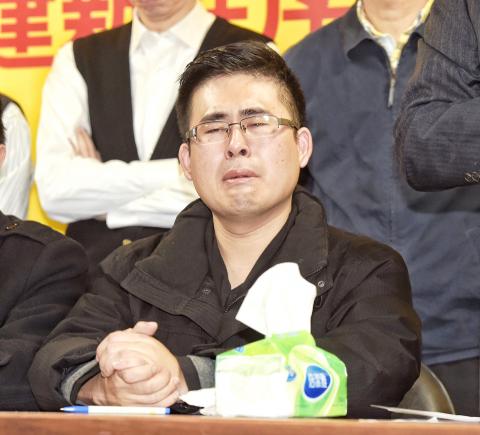New Party spokesman Wang Ping-chung (王炳忠) yesterday maintained that he has never received any funds from organizations affiliated with the Chinese Communist Party (CCP), as his party vowed to initiate a referendum to ensure witnesses’ right to an attorney following his and three other party members’ arrests on Tuesday in connection with an espionage investigation.
Wang made the remarks at a news conference at the New Party headquarters in Taipei yesterday morning, one day after he, his father and fellow party members Hou Han-ting (侯漢廷), Lin Ming-cheng (林明正) and Chen Ssu-chun (陳斯俊) were taken to the Investigation Bureau and the Taipei District Prosecutors’ Office for questioning.
They were questioned as part of a probe into suspected leaks of classified information in connection with an investigation into convicted Chinese spy Zhou Hongxu (周泓旭).

Photo: Huang Yao-cheng, Taipei Times
“They [prosecutors and investigators] acted worse than gangsters,” Wang said, alleging that they refused to let his attorney be present when they raided his residence in Taipei, held his throat in a tight grip and shoved him into a car.
Wang rejected allegations that he had financial dealings with the CCP, after investigators found an account book written in simplified Chinese and an undisclosed amount of yuan at his house.
“I have never accepted financial support from CCP-affiliated organizations. That is a fact,” Wang said.
He said the money came from legitimate business activities, including royalties from a book he published in China.
Wang added that he and his friends were mulling starting a business venture in China.
Regarding his decision to livestream the early part of the raid, which might be in violation of the law, Wang said it was made out of fear that his voice would no longer be heard and that he immediately stopped streaming after investigators entered his house.
“I only livestreamed what was happening to protect my rights,” he added.
The other three party members also lambasted prosecutors’ actions as brutal and akin to political persecution, but Hou said he remained unfettered and would not abandon his pro-unification and anti-Taiwanese independence stance.
Hou also announced his decision to run for Taipei city councilor next year to continue to safeguard the public’s welfare.
New Party Deputy Chairman Lee Sheng-feng (李勝峰) said as referendum thresholds have been lowered following the approval of amendments to the Referendum Act (公民投票法) on Tuesday last week, he planned to initiate a plebiscite to remedy legal loopholes that do not guarantee a witness’ right to an attorney.

FREEDOM OF NAVIGATION: The UK would continue to reinforce ties with Taiwan ‘in a wide range of areas’ as a part of a ‘strong unofficial relationship,’ a paper said The UK plans to conduct more freedom of navigation operations in the Taiwan Strait and the South China Sea, British Secretary of State for Foreign, Commonwealth and Development Affairs David Lammy told the British House of Commons on Tuesday. British Member of Parliament Desmond Swayne said that the Royal Navy’s HMS Spey had passed through the Taiwan Strait “in pursuit of vital international freedom of navigation in the South China Sea.” Swayne asked Lammy whether he agreed that it was “proper and lawful” to do so, and if the UK would continue to carry out similar operations. Lammy replied “yes” to both questions. The

‘OF COURSE A COUNTRY’: The president outlined that Taiwan has all the necessary features of a nation, including citizens, land, government and sovereignty President William Lai (賴清德) discussed the meaning of “nation” during a speech in New Taipei City last night, emphasizing that Taiwan is a country as he condemned China’s misinterpretation of UN Resolution 2758. The speech was the first in a series of 10 that Lai is scheduled to give across Taiwan. It is the responsibility of Taiwanese citizens to stand united to defend their national sovereignty, democracy, liberty, way of life and the future of the next generation, Lai said. This is the most important legacy the people of this era could pass on to future generations, he said. Lai went on to discuss

MISSION: The Indo-Pacific region is ‘the priority theater,’ where the task of deterrence extends across the entire region, including Taiwan, the US Pacific Fleet commander said The US Navy’s “mission of deterrence” in the Indo-Pacific theater applies to Taiwan, Pacific Fleet Commander Admiral Stephen Koehler told the South China Sea Conference on Tuesday. The conference, organized by the Center for Strategic and International Studies (CSIS), is an international platform for senior officials and experts from countries with security interests in the region. “The Pacific Fleet’s mission is to deter aggression across the Western Pacific, together with our allies and partners, and to prevail in combat if necessary, Koehler said in the event’s keynote speech. “That mission of deterrence applies regionwide — including the South China Sea and Taiwan,” he

UNPRECEDENTED: In addition to the approved recall motions, cases such as Ma Wen-chun’s in Nantou are still under review, while others lack enough signatures The Central Election Commission (CEC) announced yesterday that a recall vote would take place on July 26, after it approved the first batch of recall motions targeting 24 Chinese Nationalist Party (KMT) lawmakers and Hsinchu Mayor Ann Kao (高虹安). Taiwan is in the midst of an unprecedented wave of mass recall campaigns, following a civil society push that echoed a call made by Democratic Progressive Party (DPP) caucus whip Ker Chien-ming (柯建銘) in January to initiate signature drives aimed at unseating KMT legislators. Under the Civil Servants Election and Recall Act (公職人員選舉罷免法), Taiwanese can initiate a recall of district-elected lawmakers by collecting